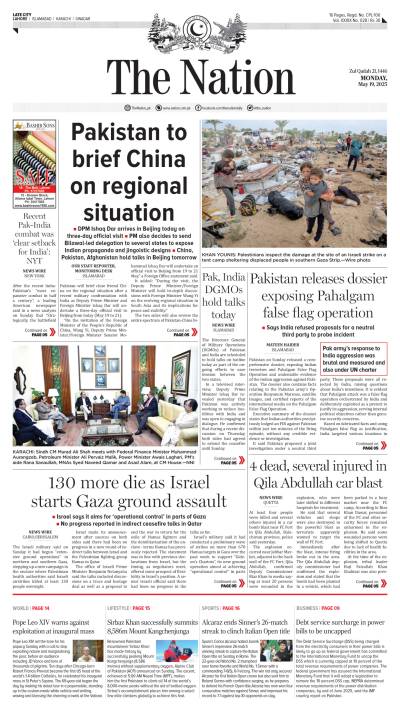LAHORE - Pakistan is increasingly becoming a victim of climate change, despite being responsible for less than 1% of the world’s carbon emissions. The country finds itself in the eye of the storm, suffering from recurring floods, heatwaves, and droughts that are wreaking havoc on its economy, environment, and people. It is evident that climate change is not a distant threat for Pakistan; it is already here, and the consequences are intensifying. One of the most glaring examples of the impact of climate change in Pakistan is the country’s escalating water crisis. The melting of glaciers in the northern regions, which are a crucial source of fresh water, has been accelerated by rising global temperatures. As a result, the Indus River, the lifeblood of Pakistan’s agricultural sector, is shrinking, causing concerns about food security and water availability for millions of people. Furthermore, unpredictable weather patterns are severely disrupting agriculture, a sector that contributes about 20% of Pakistan’s GDP and employs a large portion of the population. Farmers are grappling with erratic rainfall, which either causes devastating floods or prolonged droughts. This unpredictability makes it difficult for farmers to plan their crops, resulting in lower yields and threatening the livelihoods of millions of rural households. In urban areas, rising temperatures are becoming unbearable, especially in cities like Karachi, where heatwaves have claimed hundreds of lives in recent years. The urban heat island effect, exacerbated by unchecked urbanization and the lack of green spaces, has made cities more vulnerable to extreme weather events. Additionally, frequent power outages, driven in part by the increased demand for cooling during heatwaves, have worsened living conditions and hampered economic productivity. Coastal communities are also on the front lines of climate change. Rising sea levels and increased frequency of cyclones have begun to erode Pakistan’s coastline, particularly in the Sindh and Balochistan provinces. Thousands of people who rely on fishing and farming in these areas are being displaced, adding to the growing population of climate refugees within the country. While the situation may seem dire, there are still opportunities for Pakistan to mitigate the impacts of climate change and adapt to the new realities it presents. First and foremost, the government must prioritize the development of a comprehensive climate action plan that focuses on both mitigation and adaptation. This plan should include strategies for reducing carbon emissions, conserving water, improving disaster preparedness, and promoting sustainable agriculture. the country can reduce its reliance on expensive oil imports, cut emissions, and create new job opportunities. Moreover, expanding the use of renewable energy in rural areas could provide much-needed electricity to communities that currently lack access to reliable power.
Public awareness is another key component in the fight against climate change. Many people in Pakistan are still unaware of the causes and consequences of climate change, making it difficult to mobilize collective action. The government, along with civil society organizations, must launch educational campaigns to inform citizens about the risks they face and the steps they can take to reduce their carbon footprint and protect the environment. International cooperation is also essential. Pakistan cannot tackle climate change alone, and it must continue to advocate for climate justice on the global stage. As a country that contributes little to global emissions but suffers disproportionately from their effects, Pakistan has a moral claim to demand support from wealthier nations in the form of financial aid, technology transfers, and capacity-building initiatives. In conclusion, climate change is one of the most pressing challenges facing Pakistan today. It threatens the country’s economy, environment, and the well-being of its people. However, with decisive action and long-term planning, Pakistan can build resilience to climate impacts and contribute to global efforts to curb the progression of climate change. The time to act is now, before the crisis becomes irreversible.
Muhammad Haseeb Ahsun






